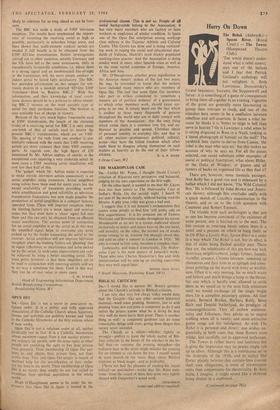OPUS DEI
SIR,—Opus Dei is not a secret or semi-secret re- ligious order. It is a public and fully approved Association of the Catholic Church whose Superiors, houses and activities 'are publicly known and listed in the Catholic Directories of the fifty nations where it now works.
Opus Dei is not a religious order at all, neither juridically nor in fact. It is a Catholic Association whose members—apart from a few secular priests— are ordinary lay people, with the same rights as other People not excluding the right to live their private lives privately. Their membership of Opus Dei per- tains to, and affects, their private lives, pot their Public lives. They join Opus Dei simply in search of spiritual help for the sanctification of their ordin- ary lay lives in the world. Their membership of Opus Dei is no secret; they simply do not feel called to broadcast their spiritual aspirations to the whole world.
Hugh O'Shaughnessy seems to be under the im- pression that Opus Dei in Spain is limited to the professional classes. This is not so. People of all social backgrounds belong to the Association; it has very many members who are factory or farm workers or employees of similar condition. In Spain one of the Opus Dei enterprises among working- class milieux is the Tajamar Athletic and Cultural Centre. This Centre has done and is doing outstand- ing work in raising the social and educational stan- dards of Vallecas, Madrid's most thickly populated working-class quarter. And the Association is doing similar work in many other Spanish cities as well as in the most varied countries of Europe, America, Africa and Asia.
Mr. O'Shaughnessy attaches great significance to the Asturian miners' strikes of the last two years. He may be interested to know that the strikers have included many miners who are members of Opus Dei. The fact that some Opus Dei members take part in strikes considered to 'constitute a massive act of political defiance' of a government in which other members work, should cause sur- prise to no one. It simply bears out the fact which is evident to those many thousands of persons throughout the world who are in daily contact with members of the Association: that the only thing which unites them is a common love for, and en- deavour to practise and spread, Christian ideals of personal sanctity in everyday life; and that in all other matters—professional, political, cultural, social—they have the fullest freedom which often leads them to disagree among themselves on such matters as heartily as do the rest of their fellow-


































 Previous page
Previous page